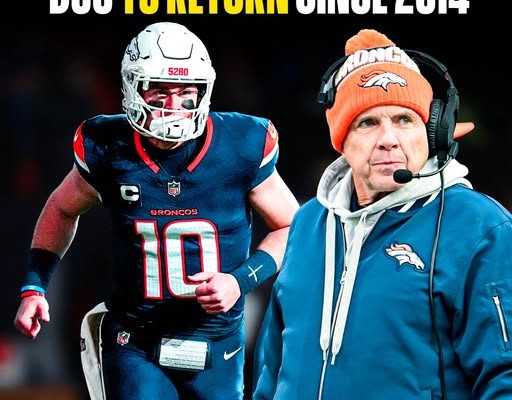**The Denver Broncos’ Decade of Quarterback and Coaching Instability: A Struggle for Consistency**
Since Peyton Manning and John Fox led the Denver Broncos to a Super Bowl appearance in 2014, the franchise has been mired in a cycle of instability at both quarterback and head coach. Over the past decade, the Broncos have failed to establish a long-term pairing under center or on the sideline, resulting in a frustrating stretch of mediocrity, missed opportunities, and organizational dysfunction. While other teams have found stability—whether through drafting a franchise quarterback, hiring the right coach, or building a cohesive system—Denver has cycled through temporary solutions, leaving fans yearning for the days of sustained success
The 2014 season marked the end of an era in Denver. Peyton Manning, though nearing the end of his career, was still a dominant force under center, and John Fox provided steady leadership as head coach. Together, they led the Broncos to a 12-4 record and an AFC Championship appearance. While they fell short in the Super Bowl against the Seattle Seahawks the year prior, the foundation was strong. The team had an identity: Manning’s cerebral command of the offense, a stout defense, and a coaching staff that maximized its talent.
But after a disappointing playoff exit in 2014, Fox was fired, and Manning’s physical decline became evident the following year. Though Gary Kubiak stepped in and guided the Broncos to a Super Bowl 50 victory with a legendary defense carrying an aging Manning, the stability was short-lived. Manning retired, Kubiak stepped away due to health concerns, and Denver’s revolving door began spinning at an alarming rate.
Finding a successor to a legend like Manning was never going to be easy, but the Broncos’ approach has been haphazard at best. They traded for Mark Sanchez in 2016, only to watch him lose the job to Trevor Siemian, a seventh-round pick who, while serviceable, was never a long-term answer. Paxton Lynch, a first-round pick in 2016, was a colossal bust, leaving Denver scrambling.
The Broncos then turned to veteran stopgaps—Case Keenum, Joe Flacco, and Teddy Bridgewater—none of whom provided more than fleeting competence. The trade for Russell Wilson in 2022 was supposed to end the drought, but instead, it became one of the most disastrous moves in franchise history. Wilson clashed with head coach Nathaniel Hackett, the offense sputtered, and Denver was forced into yet another reset after just one season.
Even the brief resurgence under Sean Payton in 2023 couldn’t mask the quarterback problem. Wilson was benched, Jarrett Stidham got a look, and the Broncos once again entered an offseason with no clear answer at the game’s most important position.
Just as concerning as the quarterback instability has been the lack of continuity on the sideline. Since Fox’s departure, the Broncos have employed five full-time head coaches (not counting interim roles), each with a different vision and none lasting more than three seasons.
Gary Kubiak’s tenure, while successful, was cut short by health issues. Vance Joseph (2017-2018) was overmatched from the start, Vic Fangio (2019-2021) was a defensive mastermind but couldn’t solve the offensive woes, and Nathaniel Hackett (2022) was one of the worst coaching hires in recent NFL memory. Sean Payton, brought in to fix the mess, has brought credibility, but even he faces questions about whether Denver can finally establish a long-term plan.
The constant turnover has led to disjointed schemes, shifting philosophies, and a locker room that has rarely had time to gel. While teams like Kansas City (Andy Reid and Patrick Mahomes) and Buffalo (Sean McDermott and Josh Allen) have thrived with consistency, the Broncos have been stuck in a cycle of reinvention.
The impact of this decade-long dysfunction is evident in the results. Since Manning’s retirement, the Broncos have had just three winning seasons (2016, 2022, 2023) and two playoff appearances—none since 2015. The offense has ranked in the bottom half of the league in most seasons, and the defense, despite flashes of brilliance, hasn’t been able to carry the team consistently.
Drafting and developing talent has also suffered. Without a stable coaching staff or quarterback, young players have struggled to find their footing. The Broncos have whiffed on key draft picks (Lynch, Bradley Chubb underperforming relative to his draft slot) and failed to build a cohesive roster. Meanwhile, the constant search for a quarterback has cost them valuable draft capital—most notably in the Wilson trade, which stripped them of multiple high picks.
The Broncos’ future hinges on finally breaking the cycle. Sean Payton’s presence is a step in the right direction—he’s a proven winner who can instill discipline and structure. But the quarterback question remains unanswered. Will Denver draft a rookie and develop him? Will they take another gamble on a veteran?
One thing is clear: Until the Broncos find a true franchise quarterback and pair him with a coach who can maximize his talents, they will remain stuck in the same frustrating loop. The last decade has been defined by turnover, false hope, and disappointment. For a franchise with a proud history and a fanbase that expects contention, the path back to relevance starts with stability—something they haven’t had since Manning and Fox.
The clock is ticking. The Broncos can’t afford another wasted decade.



